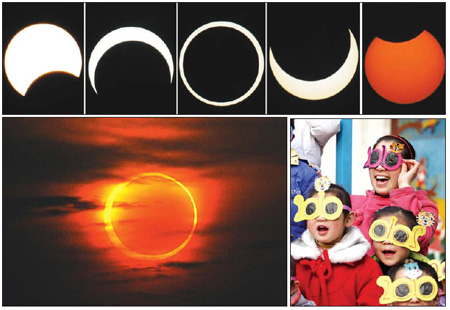Annular solar eclipse inspires awe
 |
|
Above: A series of pictures show the process of the annular eclipse on Friday in Yibin, Sichuan province. Zeng Lang Left: The annular eclipse is shown at sunset on Friday in Lianyungang, Jiangsu province. Geng Yuhe Right: Kindergarten students in Huaibei, Anhui province, watch the annular eclipse on Friday. [Wang Wen] |
Clear weather on Friday allowed millions to enjoy a rare annular eclipse in areas in Yunnan, Sichuan, Guizhou, Shaanxi, Hunan, Hubei, Henan, Anhui, Jiangsu and Shandong provinces, with millions of others across the country awed by the spectacular view of the ring of sunlight seen around the disk of the moon.
"The view was awesome," said Kou Wen, a senior engineer from the Beijing Planetarium who traveled from the capital to Dali, Yunnan, to enjoy the one of the country's best view of the longest annular eclipse for the next 1,000 years.
As an astronomy buff for more than 30 years, Kou had regretted missing the last annular eclipse visible from China in 1987 and did not want to miss the spectacle again.
Kou was not alone. Hundreds of others brought their children to the shore of Erhai Lake, the second-largest highland freshwater lake in China.
Those who were unable to make the trip chose the best location to view the stellar spectacle in home cities instead.
In Beijing, hundreds of astronomy enthusiasts gathered at the Summer Palace, one of the top viewing locations recommended by stargazers.
Still, yesterday's annularity attracted a smaller crowd in various locations compared with last year's total solar eclipse.
But Kou was not disappointed. "You can't expect every solar eclipse to draw as much sensation as it did for the one last year, which was quite exceptional," he said.
The fact that it occurred in the winter on a weekday, not like last year's total eclipse that happened on July 22 during the summer vacation, had also kept many from traveling, Kou said.
"In general, there has been a growing interest in astronomy over the past decades," Kou said.
Bao Mengxian from the Yunnan Observatory said he previously had to travel in the province months in advance of each eclipse to educate villagers about the natural phenomenon so that they would not panic when they experienced it.
"But now it is easier, they understand that it has nothing to do with evil spirits. We just have to remind them of the next eclipse so that they can enjoy it as a natural wonder."
What excited Kou most were the new converts joining Friday's eclipse chase. Pei Chengfu and two friends from Chongqing, who had driven for 24 hours to Dali, were among them.
"Education of natural wonders like solar eclipses helps spark people's interest in astronomy and astronomy sparks one's imagination," Kou said.
"Working in a planetarium, I'm really glad to see that Chinese parents are increasingly aware of the magic of astronomy and will go a step further to ensure that their children enjoy it as well."
 0
0 







Go to Forum >>0 Comments